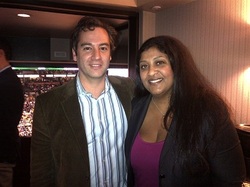
 This Wednesday, we had the unique opportunity to host a group of reporters and analysts at the Boston Celtic’s game. The Boston Celtics are a customer of our on-premise business phone solution. They took on the Brooklyn Nets, a customer of ShoreTel Sky’s cloud-based solution. We were joined by IT executives from both teams and despite the intense cloud vs. premise rivalry, all of the violence remained on the court. (Celtics point guard Rajon Rondo was suspended by the league for two games for his role in a shoving match with Nets forward Kris Humphries after a foul on Celtic’s Center Kevin Garnett.*)
0 Comments
 Last week, I had the great pleasure of joining Peter Blackmore and other ShoreTel executives for ShoreTel’s investor day at AT&T Park in San Francisco. We had the opportunity to speak to investors and analysts about the future of ShoreTel, unified communications and, of course, the acquisition of M5 Networks. This was a whole new game for me. One of the things I like best about my job is that it feels completely new every six months. I was anxious about how "The Street" would receive us. But it is great to learn from pros like Peter and his team. I thought the event was excellent.  Today, we sold the company Every month, since 2003, when co-founder Jay Kaminsky suggested that the (then) twenty-five of us should get together and talk more, I’ve played opening music at our company meetings. I try to pick songs that capture the company mood. Tomorrow, I’ll be playing Lenka’s “The Show” mixed into the new De La Soul, “Pushin’ Ahead, Pushin’ Along.” Lenka makes me tear up. De La Soul’s new hit track psyches me up. Selling M5 to ShoreTel is the solution I was looking for all year. The problem? Our market has matured. It is exploding. All the things we do -- VoiP, Unified Communications, Mobile, and Cloud -- are combining to create a perfect storm of customer demand. A classic, Geoffrey Moore style Tornado. Who wins big in a tornado? The #1 company. The leader gives Main Street buyers a safe choice, makes it easy for pragmatic buyers to join in, takes more than its share and outpaces the competition.
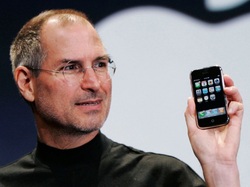 Steve Jobs touched so many aspects of my life. I wanted to write about one sliver of his legacy that directly impacted M5’s business phone system business, and illuminated our vision. Ever notice that while mobile phones are now smart, office phones are still dumb? Wikipedia claims “Smart phones” have been around since 1922. Nonetheless, I credit Jobs. iPhone was a natural extension of his original vision – from everyone having a computer to everyone having a computer everywhere, all the time. That’s the first thing missing from office phones – they are stuck on desks. People move around. The office is the worst place to work. Nothing that doesn’t move with people can extend their intelligence. 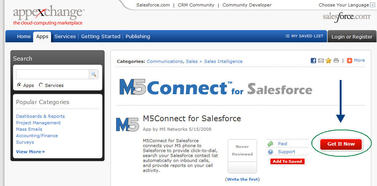 Over the last twenty years, business operations have become more dispersed. Most mid-size businesses have deployed some kind of “front-office” software to help coordinate. This is certainly better than the old manila client records that can’t be shared, let alone easily managed. Anyone that has deployed one of these systems, whether it is ACT, Salesforce.com, Siebel, or a “home-grown” CRM is familiar with their greatest weakness. The systems are passive. If staff doesn't enter notes, the system is useless. Sales teams scramble at the end of the month to enter client records so their managers can update forecasts. And that’s if you have excellent adoption. 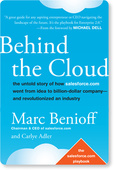 We wrote a 105-page business plan this year. The exercise was mostly a success in getting my managers to write out and share their thinking. The entire company was invited to read the plan and review it, but very few actually did. Only a portion of the senior executives read each other’s sections. The end result was an excellent roadmap, although I’m a fan of the Helmuth von Moltke the Elder quote “no plan survives first contact with the enemy.” We cooked and ate the thing, but I’m not sure we digested it.  Telecom analysts have been in my face recently with an old challenge: “you can’t be a great service provider AND a great software company.”This Telecom industry belief will go the way of “Cigarette Smoking is Good for You .” One of the reasons that the hosted IP phone system industry has not grown faster is that most players copy the old Telco mult-tier paradigm.One company builds the application, another delivers it, yet another resells it. Much gets lost in the translation, and it was all about the dial tone, not helping the customer get real impact from the applications. But voice today is really a software application, and an important one.Every major software force – Microsoft, Google, Oracle, even the open source community – are in with both feet.A software business model will win.And the right model is Software-as-a-Service, or Cloud Computing. Some obvious benefits are clear – more sophisticated applications at lower cost, less time to get up and running, and scaling flexibility that matches a company’s growth. Let’s face it, the main reason companies owned their own PBX’s was because there was no other option. 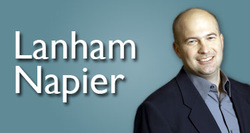 A recent Winning Workplaces blog titled, Transparency is a Business Model, highlighted how Rackspace practices transparency to differentiate their service. We’ve visited with Rackspace (thanks Graham and Lanham) and couldn’t agree more that they are setting a great standard for us all to live up to.Recently, we visited with a similar practitioner of this new art at Zappos.(another big public thank you to Tony Hsieh & team.) |
Categories
All
Archives
March 2014
|
 RSS Feed
RSS Feed